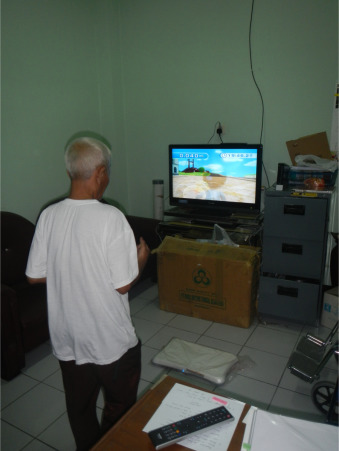Innovation
The research confirms the feasibility of a video game program based on the Wii Fit Balance Board and provides a basis for further research and development in the field of interactive exercise and rehabilitation. This highlights the research opportunities and demonstrates the potential for progress in the areas of exercise and rehabilitation.
Evaluation System
Both groups received three weekly 30-minute single sessions of supervised standard exercise cycling over a six-week period or until they were able to exercise continuously for 30 minutes at an intensity that resulted in grade 5 dyspnea on the modified 10-point Borg scale. In addition, digital arterial blood pressure, pulse rate (HR) and oxygen pulse oximetry (SpO2) were monitored. Each fitness training session included 30-minute individual sessions of the supervised, video-based program for EC patients in a special room equipped with a Wii, a balance board and a flat-screen TV. More than forty games, including yoga, strength training, aerobics and balance games that include balance, fitness and strength tests, are included in the Wii Fit physical activity program. The Wii provides on-screen guidance and assessment by a virtual personal trainer. The player performs the exercise by mimicking the virtual trainer's movements while standing or otherwise leaning on the Wii Balance Board. Wii Fit includes a feedback mechanism that can be used to check exercise compliance, as well as a score that can be displayed to users to encourage them. A Wii Fit balance board-based video game program was feasible but did not add any benefit to a well-conducted standard exercise training program in patients with COPD.
Assessment
Study indicates that expensive video programs are unnecessary for successful pulmonary rehabilitation of COPD patients. MRC and BODE index did not increase, although 6MWD, TDI, and HRQL did for both groups. This study's settings suggest that the TDI may be more sensitive than the MRC in identifying changes in dyspnea levels, confirming that different instruments measure relatively different features of the same parameter, such as dyspnea
References
Sutanto, Y. S., Makhabah, D. N., Aphridasari, J., Doewes, M., Suradi, & Ambrosino, N. (2019). Videogame assisted exercise training in patients with chronic obstructive pulmonary disease: A preliminary study. Pulmonology, 25(5), 275–282.
doi.org/10.1016/j.pulmoe.2019.03.007








